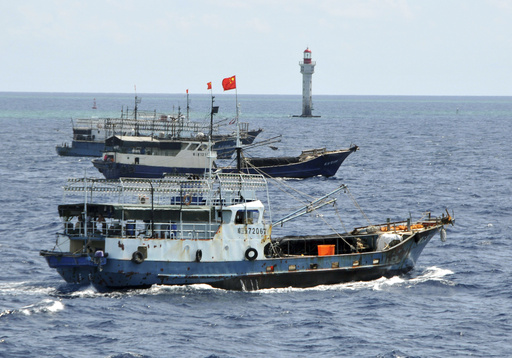SEOUL, South Korea — A recent report has revealed that a group of Chinese fishing vessels illegally employed North Korean crews between 2019 and 2024, contravening United Nations sanctions. The report highlights that many of these workers faced severe mistreatment, with some reportedly stranded at sea for several years without making landfall.
The Environmental Justice Foundation, a London-based organization focused on environmental and human rights issues, conducted the study, which identified North Korean laborers aboard 12 Chinese tuna long-liners operating in the southwest Indian Ocean. The findings were primarily derived from interviews with 19 Indonesian and Filipino fishermen who worked alongside the North Korean crews.
According to the report, testimonies from the Indonesian and Filipino crew members indicated that significant efforts were made to conceal the presence of North Koreans on these fishing vessels. It was documented that these North Korean workers were compelled to toil at sea for as long as a decade, with some never having the chance to disembark.
The report characterized the situation as an example of forced labor that exceeds much of what is commonly reported in the global fishing industry, which is notorious for various forms of exploitation. The Environmental Justice Foundation asserted that North Korean workers were transferred systematically between vessels in a process referred to as “trans-shipment” to prevent their return to land. According to unnamed Asian crew members, North Koreans on board were forbidden from using mobile phones or leaving their ships during port stops.
The charity indicated that they could not determine the total number of North Korean crew members aboard these Chinese vessels due to their subsequent transfers to different ships. Employing North Korean labor is in violation of a U.N. Security Council resolution passed in 2017, which mandated that member states halt the issuance of work permits to North Koreans and repatriate any remaining workers by the end of 2019. These sanctions were implemented following North Korea’s long-range missile tests, which breached earlier U.N. resolutions.
The report goes on to suggest that the continued usage of North Korean labor appears to circumvent legal measures in the United States and the European Union aimed at preventing North Korean-produced goods from entering their markets. Similar to Russia, China has been questioned regarding its willingness to enforce U.N. sanctions effectively against North Korea and has blocked efforts led by the U.S. to strengthen these sanctions despite North Korea’s illegal weapon tests.
There was no immediate response from China’s Foreign Ministry regarding the allegations. Prior to the U.N. 2019 deadline, it is estimated that tens of thousands of North Koreans were employed overseas, mainly in China and Russia, to generate essential foreign currency through factory work, restaurant services, logging operations, and construction jobs. This is the first documented evidence of North Korean laborers being employed on distant-water fishing vessels.
Typically, North Korean workers abroad are monitored continuously by security personnel from their home country, work excessive hours exceeding 12 on most days, and receive only a fraction of their earnings, with the bulk of their salaries diverted to the North Korean government, as reported by defectors and experts in the field. Despite the U.N. sanctions, South Korean officials and analysts believe that a significant number of North Korean workers continue to engage in economic activities around the globe, with some of their earnings potentially being funneled towards funding the country’s nuclear weapons initiatives.


